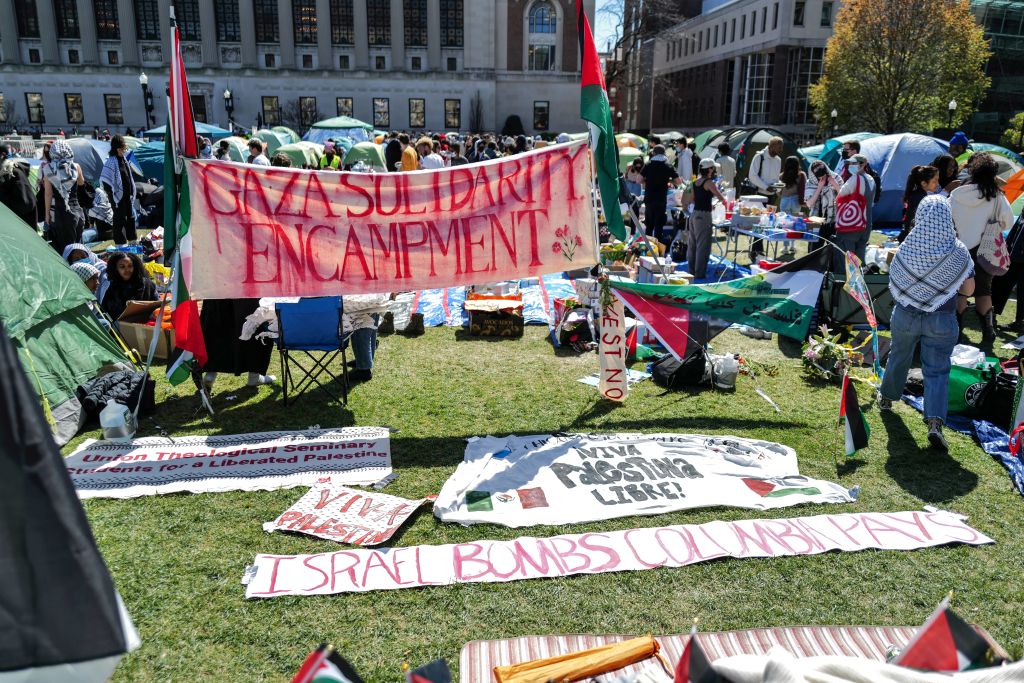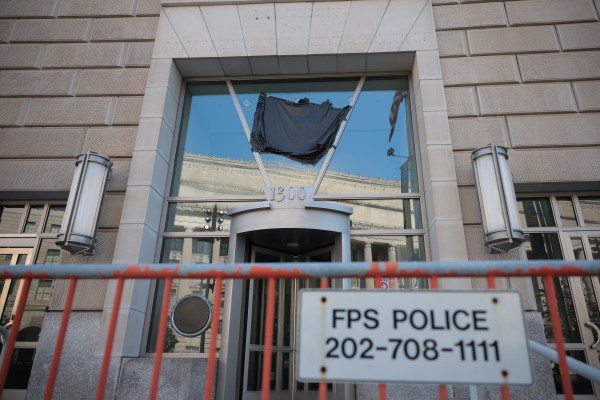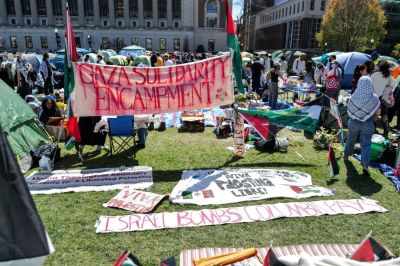Happy Tuesday! There unfortunately won’t be a new episode of Dispatch Live tonight, but our weekly live-streamed conversation will return next Tuesday at 8 p.m. ET!
Quick Hits: Today’s Top Stories
- A military base in Syria housing U.S.-led coalition troops was hit by rocket fire late Sunday night. No organization has yet claimed responsibility for the attack, the first on U.S. bases in Iraq and Syria since the U.S. conducted retaliatory strikes on Iranian-backed proxies in the region in February. On Monday morning, Iraqi officials said they are actively seeking “outlaw elements” believed responsible for firing an estimated five missiles from Iraq across the border into Syria. U.S. Central Command has not commented publicly on the aerial assault, which reportedly did not result in any casualties or injuries.
- The head of Israel’s Military Intelligence Directorate announced on Monday his intention to resign from his role over the intelligence failures that led to Hamas’ October 7 attack. An Israel Defense Forces (IDF) spokesperson said that Maj. Gen. Aharon Haliva will step down once a replacement is selected, making Haliva the first senior IDF official to resign over the October 7 attack. “I have carried that black day with me ever since,” Haliva wrote in his resignation letter. “Every day, every night.”
- Authorities in the United Kingdom charged two men on Monday—a 29-year-old and a 32-year-old—with spying on behalf of China. One of the men was reportedly employed as a researcher for Conservative Party members of parliament. Meanwhile, Germany arrested three German citizens on Monday who were also suspected of spying for Beijing. German authorities allege the men were connected to China’s Ministry of State Security—an intelligence agency—and helped gather sensitive data on marine engine machinery and illegally shipped a high-powered laser to China.
- The Supreme Court agreed on Monday to hear a case concerning the regulation of “ghost guns,” firearms easily assembled from parts or kits. The Bureau of Alcohol, Tobacco, Firearms, and Explosives sought to regulate ghost guns by requiring serial numbers for gun parts and mandating sellers of these parts to conduct background checks. In June, a federal district judge said these ghost gun restrictions cannot be applied through current federal firearm laws. The Supreme Court is expected to hear oral arguments for the case—Garland v. VanDerStok—in October. Meanwhile, the Supreme Court declined to hear a case brought forth by GOP Senate candidate Kari Lake and former state legislator Mark Finchem challenging the use of electronic voting machines in Arizona. The lawsuit was initially filed in late 2022 when the pair were campaigning for statewide offices—races both of them ultimately lost.
- The Supreme Court heard oral arguments on Monday in a case considering the constitutionality of bans on homelessness encampments in Grants Pass, Oregon—specifically examining whether the city’s bans violate the Eighth Amendment’s prohibition on “cruel and unusual punishments.” Grants Pass’ legal representatives defended the ordinances, arguing the city “relies on camping laws to protect its public spaces.” A lawyer representing homeless residents argued the city’s laws make it “physically impossible for a homeless person to live in Grants Pass” without the risk of legal repercussions. The justices seemed divided on the constitutionality of the law.
- Opening statements concluded on Monday in former President Donald Trump’s New York criminal trial involving alleged hush-money payments made to porn star Stormy Daniels and others in the lead-up to the 2016 election. David Pecker, who once published The National Enquirer tabloid, was the first witness for the prosecution and testified that his publication bought and shelved stories that might have been damaging to Trump. Judge Juan Merchan said prosecutors are permitted to reference Trump’s New York civil fraud case and the defamation case brought by E. Jean Carroll. Meanwhile, Judge Arthur Engoron accepted Trump’s $175 million bond posted in that New York civil fraud case in order to appeal the case, which he intends to do.
- A series of earthquakes rocked Taiwan early Tuesday morning, just weeks after the island experienced its most powerful earthquake in 25 years. According to the U.S. Geological Survey, the strongest earthquake had a magnitude of 6.1, while a half-dozen others ranged from magnitudes of 4.5 to 6. While it appears there were no casualties caused by this most recent wave, the earthquake from earlier this month killed 13 people and injured a thousand others.
Antisemitism Continues to Plague College Campuses

On the eve of Passover, Rabbi Elie Buechler, the director of the Orthodox Union-Jewish Learning Initiative at Columbia University, shared a warning with hundreds of Jewish students at the elite university in New York City. “The events of the last few days, especially last night, have made it clear that Columbia University’s Public Safety and the NYPD cannot guarantee Jewish students’ safety in the face of extreme antisemitism and anarchy,” he wrote in a WhatsApp message. “I would strongly recommend you return home as soon as possible and remain home until the reality in and around campus has dramatically improved.”
The “reality in and around” Columbia’s campus is bleak: An almost week-long encampment of anti-Israel and pro-Palestianian protesters on the main lawn has become a national flashpoint, drawing condemnation from leaders at all levels of government and spawning copycat encampments at elite colleges across the country. Columbia’s administration has failed to protect Jewish students from the antisemitic harassment and intimidation emanating from the tent camp and protesters surrounding the campus, once again calling into question the ability and willingness of university administrations to safeguard some of their own students.
Early Wednesday morning, hundreds of students began a protest and erected a tent city—which organizers dubbed the “Gaza Solidarity Encampment”—occupying a lawn in the middle of the school’s campus. The start of the encampment intentionally coincided with Columbia President Minouche Shafik’s testimony before Congress about the rise in antisemitism on her campus. She told lawmakers that the university doesn’t “tolerate antisemitic threats, images, and other violations.”
The next day, Shafik requested that the New York City Police Department (NYPD) intervene on her campus. “The actions of these individuals are in violation of university rules and policies, including that they have interfered with the operation of the university, refused to identify themselves, refused to disperse, set up tents on campus space, failed to comply with policies, and damaged campus property,” she wrote in a letter to the NYPD. “The continued encampment raises safety concerns for the individuals involved and the entire community.”
NYPD officers cleared the encampment later on Thursday, arresting 108 students—including Democratic Rep. Ilhan Omar’s daughter—in the process. But the protesters quickly regrouped and set up a new encampment on the other side of the lawn that has continued uninterrupted. The organizers’ demands include that Columbia end its dual degree program with Tel Aviv University and sever ties with any other Israeli academic institutions. They also demand the university publish a statement calling for a permanent ceasefire in Gaza and “[denounce] the ongoing genocidal campaign against the Palestinian people.”
Following the encampment arrests, some Columbia faculty and staff staged a walkout in support of the protesters. Barnard College President Laura Ann Rosenbury said in a letter on Monday that students suspended for participating in the encampment could have their suspension lifted “if they agree to follow all Barnard rules during a probationary period.”
Since Hamas’ October 7 attacks—in which terrorists murdered an estimated 1,200 men, women, and children in Israel—Jewish Americans have had to contend with a wave of antisemitism sweeping across the country. The Anti-Defamation League (ADL) tracked nearly 8,900 antisemitic incidents in 2023, a 140 percent increase over 2022 and the highest annual number in the more than 40 years ADL has recorded incidents. College campuses have been a focal point for many of those incidents. Elite universities’ lackluster responses to antisemitism already toppled Harvard University President Claudine Gay and University of Pennsylvania President Liz Magill, and Shafik now faces calls to resign from more than a dozen lawmakers.
There’s no denying the antisemitism that has exploded on and around Columbia’s campus in recent days. Jewish students were harassed on the streets directly outside the campus early Friday by masked individuals yelling, “The 7th of October is going to be every day for you.” Other protesters outside the campus shouted chants in support of Hamas, including, “We say justice, you say how? Burn Tel Aviv to the ground,” and “Hamas, we love you. We support your rockets, too.” Others shouted references to Hamas’ military wing: “Al-Qassam, make us proud, kill another soldier now.”
One member of a group of Jewish students waving Israeli flags and singing songs by Jewish pop singer Matisyahu was assaulted and chased off campus on Saturday night after attempting to retrieve a flag stolen by a protester. Protesters told the student to “go back to Poland,” and one masked individual stood before a group of people waving Israeli flags with a sign suggesting they were “Al-Qassam’s next targets.”
The activists have repeatedly cited their First Amendment rights as criticism of their tactics has grown, and they of course have a right to protest—but not a right to break university rules and occupy regulated spaces. Plus, free speech and assembly rights do not protect targeted harassment. “True threats and incitement to violence, as defined by the Supreme Court, are not protected,” the Foundation for Individual Rights and Expression noted in a statement on Monday. “Neither is discriminatory harassment: targeted conduct that is so severe, pervasive, and objectively offensive that it denies the targeted student access to an educational opportunity or benefit. And when protesters surround opposing speakers or otherwise prevent students from freely moving around campus, they cross the line separating protected expression and unprotected misconduct.”
It’s always challenging to assign responsibility for harassment and intimidation to individuals in the chaos of protests, but even more so in a sea of masked protesters on a college campus in the middle of New York City. As Yoni Kurtz—a history student at Columbia and president of the Columbia/Barnard College Hillel Student Executive board—explained, there has been a divide between Pro-Palestinian student protesters on campus, who may shout antisemitic slogans and express support for Hamas but have largely refrained from violence themselves, and New York City residents who show up at campus entrances. “Last night, the people outside campus were even more unhinged than usual, and it seems that some even snuck on to campus,” he suggested based on his own experience on Saturday night. “[People] have for a long time pretended that students on campus protesting are the exact same level of dangerous and crazy as the people on the streets. … This is definitely not true.”
Still, that distinction has somewhat collapsed over the last few days. “It is a sad failure of all student protesters for Palestine, from the leaders to those who only joined in the last few days, not to disavow this violence,” Kurtz said. On Sunday night, protesters at the encampment surrounded Jewish students to physically intimidate the students into leaving, saying,“We have Zionists who have entered the camp.”
State, local, and federal officials from both parties have condemned the developments. New York City Mayor Eric Adams said he was “horrified and disgusted with the antisemitism being spewed at and around the Columbia University campus.” New York’s congressional delegation—several members of which visited Columbia yesterday—denounced the targeting of Jewish students. “Over the past several days, the rhetoric has escalated to a point where Jewish students feel unsafe, insecure and broadly harassed, to the point where the president had to cancel classes today and make them virtual,” said Democratic Rep. Daniel Goldman. “That is unacceptable for a university. That is unacceptable for an academic institution.”
Goldman’s Democratic colleague, Rep. Jared Moskowitz of Florida, called on the Department of Education to take action against the school for failing to protect students. “Not enough is being done,” he said. “If this was any other group on campus, this would not be happening.”
GOP House Education and Workforce Chair Virginia Foxx sent a letter to Columbia on Sunday threatening consequences if the university does not act. “Columbia’s continued failure to restore order and safety promptly to campus constitutes a major breach of the University’s Title VI obligations, upon which federal financial assistance is contingent, and which must immediately be rectified,” she wrote. “If you do not rectify this danger, then the committee will not hesitate in holding you accountable.” Columbia, along with Cornell and Penn, are already being investigated by the Education Department over alleged antisemitic and Islamophobic incidents.
The White House chimed in on Sunday with a statement condemning the antisemitism at the weekend’s demonstrations. “While every American has the right to peaceful protest, calls for violence and physical intimidation targeting Jewish students and the Jewish community are blatantly antisemitic, unconscionable, and dangerous—they have absolutely no place on any college campus, or anywhere in the United States of America,” White House spokesman Andrew Bates said on Sunday. Unlike previous statements on antisemitism on campus, the White House didn’t include a side-by-side condemnation of Islamophobia. But President Joe Biden added one back in on Monday. “I condemn the antisemitic protests,” told reporters yesterday. “I also condemn those who don’t understand what’s going on with the Palestinians.”
Mayor Adams has called on the university to increase cooperation with the NYPD to ensure students’ safety. NYPD officials have said that because the school is a private institution on private property, law enforcement can only have a presence on campus at the request of the school—as was the case with the Thursday encampment clearing—or unless crimes have been committed or are imminent. “Absent some ongoing crime, we cannot just go onto Columbia campus as we see fit,” NYPD Deputy Commissioner Michael Gerber said yesterday. “As a general matter, Columbia University, and this goes back many years, does not want NYPD present on campus, that is their decision.” The NYPD has, however, maintained a significant presence on streets surrounding the campus.
Columbia announced an increase in campus security guard patrols on Monday, and Shafik said in a statement yesterday the administration would create a “working group” of administration officials and faculty to “bring this crisis to a resolution.” She acknowledged the calls for police to be present on campus, but emphasized that “we should be able to do this ourselves.” Shafik also canceled in-person classes on Monday “to deescalate the rancor and give us all a chance to consider next steps,” and the university announced last night that courses will be hybrid (both in-person and virtual) through the end of the semester.
But some Jewish organizations are not waiting for the administration to keep students safe. The university’s Chabad chapter, for example, said it hired additional armed guards to protect Jewish students as they attend Passover meals this week. The Kraft Center for Jewish Student Life said on Sunday that the center would remain open as a safe haven. But Robert Kraft—the billionaire New England Patriots owner and Columbia donor for whom the center is named—is severing ties with the university. “I am no longer confident that Columbia can protect its students and staff,” he said in a statement Monday. “And I am not comfortable supporting the university until corrective action is taken.”
The unrest in recent days hasn’t been limited to Columbia. Protests and encampments in solidarity with the Columbia protesters have emerged on at least a dozen other campuses, including the Massachusetts Institute of Technology (MIT). MIT President Sally Kornbluth is the only one of the three university presidents who testified at a congressional hearing on antisemitism in December and still holds her job. Authorities arrested 60 protesters at Yale University—47 of whom were students—on Monday, and the NYPD broke up a protest occupying a portion of New York University’s campus last night, making “numerous arrests.”
Some Jewish students at Columbia feel unsupported by the school. “Where were you when the Jewish students were being harassed?” David Jonah Lederer, one of the students waving Israeli flags on Saturday night, said last night when asked about the faculty and staff walkout protesting the encampment arrests. “Why are they not walking out for us?”
Worth Your Time
- John Sterling, the longtime broadcast announcer for New York Yankees baseball, abruptly retired last week from the position he’s held since 1989. On a recent episode of “Effectively Wild,” baseball journalist Ben Lindbergh reminisced on the profound nostalgia evoked by a beloved team’s announcer—especially for those who grew up listening to that voice. “I’m not watching the Yankees or listening to the Yankees every day anymore the way I was when I was a fan, and haven’t listened to a whole lot of John Sterling lately—but it was still reassuring to know that he was there, that I could tune in and hear him and it would take me back,” he said. “Because everyone’s had this relationship with their team’s broadcaster. Not every team has a longtime broadcaster who’s just been such a stalwart in the booth for them, but if you have had that person, then you know, they’re yours, right? And you’re theirs. … When I hear John Sterling’s voice, I am taken back to Game Five of the 2001 World Series under the covers because it was late and I had to go to bed and it looked like the Yankees were going to lose, but I was sneakily listening to the radio under the blankets anyway. And then he called Scott Brosius’ incredible, semi-miraculous home run, yet another amazing Yankees comeback, and then I was tearing out of the bedroom to turn on the TV and see it for myself. … Those moments are just indelible, and hearing that voice will just forever call that back.”
Presented Without Comment
New York Times: Papua New Guinea Leader Criticizes Biden’s ‘Cannibals’ Comment
Twice last week, Mr. Biden suggested without evidence that his uncle had been eaten by cannibals.
“He got shot down in New Guinea, and they never found the body because there used to be — there were a lot of cannibals, for real, in that part of New Guinea,” Mr. Biden said of his uncle during an address on steel and aluminum tariffs in Pittsburgh on Wednesday.
…
Mr. Biden’s description of his uncle’s death does not match military records. Ambrose Finnegan, a brother of Mr. Biden’s mother, was a passenger in an aircraft that “for unknown reasons” had to ditch in the Pacific Ocean off the northern coast of New Guinea on May 14, 1944, according to the Pentagon’s Defense POW/MIA Accounting Agency. Both of the plane’s engines failed at low altitude. There is no indication the aircraft was shot down.
Also Presented Without Comment
The Hill: [Robert F. Kennedy Jr.] on Relatives Endorsing Biden: ‘I Love My Family, Either Way’
In The Zeitgeist
Watch this shot from Nelly Korda, who on Sunday went on to win her fifth tournament in as many LPGA tour starts:
Toeing the Company Line
- Today is the last chance for members to ask questions of new deputy managing editor Wendy Lane Cook in the Dispatch Monthly Mailbag (🔒)! If you want to know more about her experience covering the Olympics, her time in local news, and her thoughts on the true taco capital of Texas, be sure to drop your questions in the comments here.
- In the newsletters: Kevin panned (🔒) J.D. Vance’s policy of pinching pennies for Putin and the Dispatch Politics crew reported on the growing tensions in the House GOP conference.
- On the podcasts: Sarah and David discuss the oral arguments in a Supreme Court case about homeless encampments on Advisory Opinions.
- On the site: John digs into the Department of Justice’s suit against Idaho over its abortion law, Philip Wallach looks back on the last six months of Mike Johnson’s speakership, and Chris draws some comparisons between the strange appeals of Donald Trump and John Dillinger.
Let Us Know
How should university administrations handle antisemitism on their campuses?








Please note that we at The Dispatch hold ourselves, our work, and our commenters to a higher standard than other places on the internet. We welcome comments that foster genuine debate or discussion—including comments critical of us or our work—but responses that include ad hominem attacks on fellow Dispatch members or are intended to stoke fear and anger may be moderated.
With your membership, you only have the ability to comment on The Morning Dispatch articles. Consider upgrading to join the conversation everywhere.